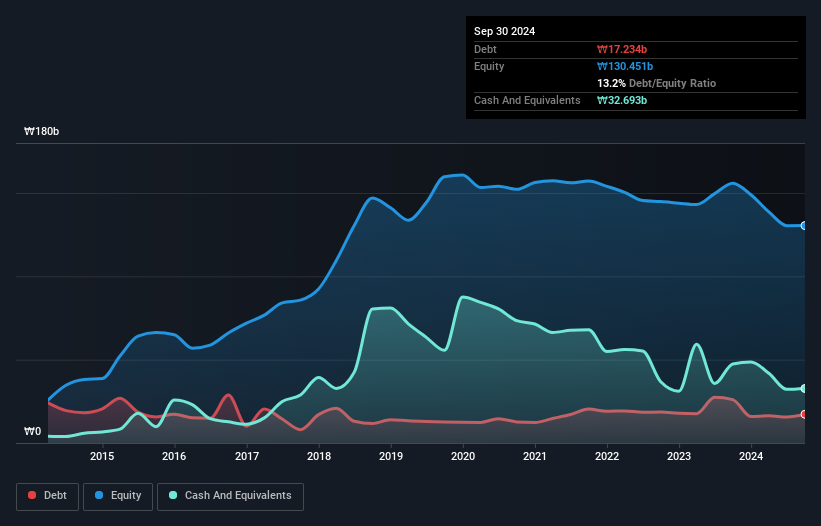- South Korea
- /
- Semiconductors
- /
- KOSDAQ:A086390
Does UniTest Incorporation (KOSDAQ:086390) Have A Healthy Balance Sheet?
The external fund manager backed by Berkshire Hathaway's Charlie Munger, Li Lu, makes no bones about it when he says 'The biggest investment risk is not the volatility of prices, but whether you will suffer a permanent loss of capital.' So it might be obvious that you need to consider debt, when you think about how risky any given stock is, because too much debt can sink a company. As with many other companies UniTest Incorporation (KOSDAQ:086390) makes use of debt. But is this debt a concern to shareholders?
Why Does Debt Bring Risk?
Debt is a tool to help businesses grow, but if a business is incapable of paying off its lenders, then it exists at their mercy. Part and parcel of capitalism is the process of 'creative destruction' where failed businesses are mercilessly liquidated by their bankers. While that is not too common, we often do see indebted companies permanently diluting shareholders because lenders force them to raise capital at a distressed price. Of course, debt can be an important tool in businesses, particularly capital heavy businesses. When we examine debt levels, we first consider both cash and debt levels, together.
See our latest analysis for UniTest Incorporation
How Much Debt Does UniTest Incorporation Carry?
The image below, which you can click on for greater detail, shows that UniTest Incorporation had debt of ₩17.2b at the end of September 2024, a reduction from ₩26.1b over a year. But it also has ₩32.7b in cash to offset that, meaning it has ₩15.5b net cash.

How Healthy Is UniTest Incorporation's Balance Sheet?
We can see from the most recent balance sheet that UniTest Incorporation had liabilities of ₩39.9b falling due within a year, and liabilities of ₩11.8b due beyond that. Offsetting these obligations, it had cash of ₩32.7b as well as receivables valued at ₩32.6b due within 12 months. So it can boast ₩13.6b more liquid assets than total liabilities.
This surplus suggests that UniTest Incorporation has a conservative balance sheet, and could probably eliminate its debt without much difficulty. Succinctly put, UniTest Incorporation boasts net cash, so it's fair to say it does not have a heavy debt load! When analysing debt levels, the balance sheet is the obvious place to start. But you can't view debt in total isolation; since UniTest Incorporation will need earnings to service that debt. So if you're keen to discover more about its earnings, it might be worth checking out this graph of its long term earnings trend.
Over 12 months, UniTest Incorporation made a loss at the EBIT level, and saw its revenue drop to ₩73b, which is a fall of 64%. To be frank that doesn't bode well.
So How Risky Is UniTest Incorporation?
By their very nature companies that are losing money are more risky than those with a long history of profitability. And we do note that UniTest Incorporation had an earnings before interest and tax (EBIT) loss, over the last year. Indeed, in that time it burnt through ₩4.6b of cash and made a loss of ₩20b. But the saving grace is the ₩15.5b on the balance sheet. That kitty means the company can keep spending for growth for at least two years, at current rates. Even though its balance sheet seems sufficiently liquid, debt always makes us a little nervous if a company doesn't produce free cash flow regularly. There's no doubt that we learn most about debt from the balance sheet. However, not all investment risk resides within the balance sheet - far from it. We've identified 2 warning signs with UniTest Incorporation , and understanding them should be part of your investment process.
When all is said and done, sometimes its easier to focus on companies that don't even need debt. Readers can access a list of growth stocks with zero net debt 100% free, right now.
New: AI Stock Screener & Alerts
Our new AI Stock Screener scans the market every day to uncover opportunities.
• Dividend Powerhouses (3%+ Yield)
• Undervalued Small Caps with Insider Buying
• High growth Tech and AI Companies
Or build your own from over 50 metrics.
Have feedback on this article? Concerned about the content? Get in touch with us directly. Alternatively, email editorial-team (at) simplywallst.com.
This article by Simply Wall St is general in nature. We provide commentary based on historical data and analyst forecasts only using an unbiased methodology and our articles are not intended to be financial advice. It does not constitute a recommendation to buy or sell any stock, and does not take account of your objectives, or your financial situation. We aim to bring you long-term focused analysis driven by fundamental data. Note that our analysis may not factor in the latest price-sensitive company announcements or qualitative material. Simply Wall St has no position in any stocks mentioned.
About KOSDAQ:A086390
UniTest Incorporation
Manufactures and sells semiconductor testing equipment in South Korea.
Exceptional growth potential with mediocre balance sheet.
Similar Companies
Market Insights
Community Narratives




